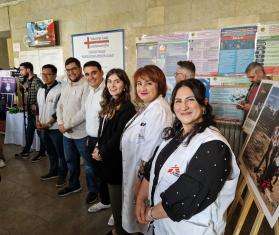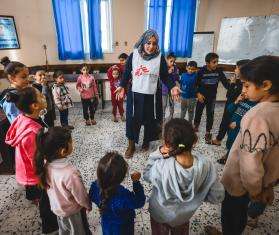NEW YORK/GENEVA, April 15, 2024—Ahead of Gavi, the Vaccine Alliance’s Board Retreat this week—where the Board will shape Gavi’s strategic framework for the next five years—the international medical humanitarian organization Doctors Without Borders/Médecins Sans Frontières (MSF) stressed that Gavi and its Board need to do more to get vaccines to people in humanitarian settings like those in which MSF operates. Gavi, which is funded by public and private donors like the US government, was set up 20 years ago to pay for vaccines for the world's poorest countries.
“Between October and December 2023, admissions of people with measles to MSF facilities in Maiduguri in northeast Nigeria reached record numbers, with 3,965 patients treated—almost three times more than for the same period in 2022,” said Abdulwahab Mohamed, MSF medical coordinator in Nigeria. “The alarming rise in the number of cases is partly due to the challenges of running vaccination campaigns in the rural communities surrounding Maiduguri, which include building community trust and oftentimes simply being unable to access some areas due to insecurity in the region. Gavi should adapt their policies and practices so vaccine providers like MSF, which are able to access hard-to-reach places, can more readily protect people, especially children, from vaccine-preventable diseases.”
To reach people outside of government vaccination activities—or who have little or no convenient access to vaccination—MSF is calling on Gavi to incorporate the following recommendations into its upcoming five-year strategy:
- Make vaccine support for children up to age five a permanent Gavi policy for all relevant vaccines so that children up to age five who missed out on their routine vaccines due to immunization disruptions are eligible to receive “catch-up” vaccinations and be fully protected from vaccine-preventable diseases.
- Develop framework agreements with governments to guarantee that non-governmental organizations (NGOs) can quickly and efficiently engage in vaccination activities in hard-to-reach areas. Currently, access to fragile or emergency areas is negotiated on a case-by-case basis, making the rollout of vaccination activities slow and cumbersome.
- Enable the creation of in-country stocks of vaccine doses to which, as part of framework agreements with governments, NGOs have swift and unhindered access when undertaking vaccination activities, including for reactive outbreak campaigns and for people in hard-to-reach areas. Gavi should also ensure direct and rapid access to vaccine doses from Gavi/UNICEF to NGOs when necessary.
- Provide direct funding for staffing to support vaccination activities by NGOs and local civil society organizations (CSOs), to ensure independence from governments and prioritize safety and success in insecure regions. Gavi should also fast-track the disbursement of in-country funds to support the implementation of reactive outbreak campaigns, including those in fragile and humanitarian settings.

For more than five decades, MSF has been vaccinating children through routine vaccinations, including in response to outbreaks of disease in some of the world’s most challenging humanitarian contexts. In 2019, for example, MSF teams vaccinated a large group of children who had not received a single vaccine dose in two years against nine vaccine-preventable diseases in Mingala, a remote area in the Central African Republic.
“We’re seeing people in humanitarian settings falling through the cracks because government-run immunization activities are sometimes unable to reach certain areas, even in cases where nationwide vaccination campaigns are underway,” said Alain Alsalhani, head of MSF’s vaccination working group. “Gavi must ensure agreements are in place with ministries of health so that NGOs can maintain the operational freedom to vaccinate children in hard-to-reach places and can have systematic and independent access to Gavi-funded vaccine doses instead of relying on the current ad hoc approaches for accessing vaccines. An approach structured in this way will allow for more children in fragile and humanitarian settings to be protected from killer diseases in a more timely manner.”




